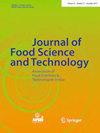Evaluation of Enterococcus faecium Ch-1 isolated from Chuli- A traditional fermented apricot product of Trans Himalayan region
IF 3.3
3区 农林科学
Q2 FOOD SCIENCE & TECHNOLOGY
引用次数: 1
Abstract
Background: Chuli is a naturally fermented apricot fruit product of Himachal Pradesh and is a rich source of polyphenols and other phytochemicals such as betacarotene and ascorbic acid. In the present research work potential lactic acid bacteria were isolated and explored for its novelty as potential probiotics. Methods: Isolates were screened on the basis of broadest inhibitory spectrum against var ious food borne pathogens i.e , and hence was selected for further study i.e acid and bile tolerance, adherence to gastric mucin sensitivity towards different antibiotics. its relative safety as probiotic candidate was also assessed. Results: Highest antagonism was show by Enterococcus faecium Ch-1 and was found to be tolerant to low pH and high bile concentrations, adherance to gastric mucin. E. faecium Ch-1 was found negative for gelatinase, DNase enzyme activity and haemolysis thus validating its relative safety as probiotic candidate. Conclusion: Enterococcus faecium Ch-1 was found to be a good probiotic strain with cumulative probiotic score of 100% therefore, could be promising for the development as suitable isolate for use in functional foods.跨喜马拉雅地区传统发酵杏产品Chuli中粪肠球菌Ch-1的分离鉴定
背景:Chuli是喜马偕尔邦天然发酵的杏果产品,富含多酚和其他植物化学物质,如β -胡萝卜素和抗坏血酸。在目前的研究工作中,对乳酸菌作为潜在益生菌的新颖性进行了分离和探索。方法:以对多种食源性致病菌最广泛的抑菌谱为基础,筛选分离菌株进行酸、胆耐受性、胃粘蛋白对不同抗生素敏感性的进一步研究。并对其作为候选益生菌的相对安全性进行了评价。结果:粪肠球菌Ch-1表现出最高的拮抗作用,对低pH和高胆汁浓度具有耐受性,并粘附于胃粘蛋白。大肠杆菌Ch-1明胶酶、脱氧核糖核酸酶和溶血酶活性均为阴性,证实其作为候选益生菌的相对安全性。结论:粪肠球菌Ch-1是一种良好的益生菌菌株,其累积益生菌评分为100%,具有开发应用于功能食品的前景。
本文章由计算机程序翻译,如有差异,请以英文原文为准。
求助全文
约1分钟内获得全文
求助全文
来源期刊
CiteScore
7.70
自引率
0.00%
发文量
274
审稿时长
11 months
期刊介绍:
The Journal of Food Science and Technology (JFST) is the official publication of the Association of Food Scientists and Technologists of India (AFSTI). This monthly publishes peer-reviewed research papers and reviews in all branches of science, technology, packaging and engineering of foods and food products. Special emphasis is given to fundamental and applied research findings that have potential for enhancing product quality, extend shelf life of fresh and processed food products and improve process efficiency. Critical reviews on new perspectives in food handling and processing, innovative and emerging technologies and trends and future research in food products and food industry byproducts are also welcome. The journal also publishes book reviews relevant to all aspects of food science, technology and engineering.

 求助内容:
求助内容: 应助结果提醒方式:
应助结果提醒方式:


